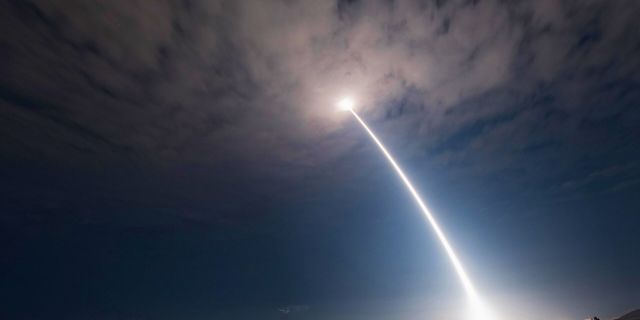Do we not have the necessary nuclear weapons to deter Russia and China?The United States is in an unenviable position, because they do not have the necessary weapons to deter Russia from using low-power nuclear warheads, writes The Hill.
The author complains that the main drawback of the American nuclear forces is the inability to "give a convincing answer".
Gordon G. ChangLast Thursday, Admiral Charles Richard, who heads the US Strategic Command, said that America was "furiously" rewriting its nuclear doctrine.
He made it clear that the Americans are not ready for a possible development of events. The conflict of the great Powers is looming. "We are on the verge of war with Russia and China," Henry Kissinger said in an interview with the Wall Street Journal, which was published on Friday.
Unfortunately, both Moscow and Beijing are apparently ready to use their most destructive weapons in the event of such a war.
Speaking in Huntsville at a symposium on space and missile defense, Richard said that such a situation is "unprecedented in the history of our country." According to him, America has never "simultaneously faced two opponents equal to it in strength and capable of using nuclear weapons, which must be restrained in different ways."
Until now, America has used a universal, one-size-fits-all strategy inherited from the Cold War. At that time, the United States of America and the Soviet Union possessed sufficient nuclear potential to destroy each other multiple times. As Barry Goldwater very indelicately put it, the Soviets knew that the United States could "bang such a bomb on the men's toilet in the Kremlin." As a result, not a single Kremlin secretary General dared to launch a tank armada into the Fulda corridor in Germany, which in the post-war period was most feared by strategists from NATO countries. Thanks to the concept of "guaranteed mutual destruction", it was possible to maintain a fragile peace.
Now many fear that the concept of deterrence from the Cold War is no longer valid. For example, Vladimir Putin gives the impression that he is not afraid of the prospect of nuclear Armageddon. On February 27, he put his nuclear forces on high alert. On the first of March, he actually sent his ballistic missile submarines on a campaign and arranged a so-called training with the participation of ground-based mobile missile systems.
The Russian nuclear doctrine is called "escalation for the sake of de-escalation" or "escalation for the sake of victory." This means that at the initial stage of a non-nuclear conflict, Moscow may threaten to use nuclear weapons or use them. It is obvious that Putin's threats worked and kept the United States and its partners from providing full support to Ukraine. As Richard stated in Huntsville, "Moscow uses covert and explicit nuclear coercion."
"The Russians are trying to use an imaginary gap in the deterrence system, a threshold below which, as they mistakenly believe, they have the opportunity to use nuclear weapons," the admiral said, referring to Russian operational and tactical nuclear weapons. The American leadership is alarmed by Russia's actions, and as the Defense One portal notes, "it can use small warheads in limited quantities and for specific purposes without unleashing a global thermonuclear war, which the Russians have been afraid of for decades."
There are many reasons for concern. Among other things, the United States does not have the necessary "non-strategic weapons". America has free-fall nuclear bombs, but Russia knows that they are poorly protected when stored in warehouses and when delivered to the target by aircraft that fly through disputed airspace. Moreover, there is almost always a long period of time between the order to strike and the withdrawal of the aircraft to the target. And in a nuclear war, this is a critical flaw.
Moreover, the US Navy needs a new generation of short- and medium-range cruise missiles in nuclear equipment, mainly due to the fact that various presidents, including the current one, have hindered their development. Congress is trying to fix the situation, but America is still in an unenviable position, since it does not have the necessary weapons to keep Russia from using low-power warheads. Putin probably believes that the United States will not start a general thermonuclear war because of a single strike with tactical weapons.
Kissinger and other analysts offer beautiful theories of deterrence, but only one factor matters: what the enemy thinks. We can confidently say that deterrence fails, because America's opponents think that no American president will promise to strike with a megaton-power weapon in order to prevent low-power strikes.
Thus, there is a "gap in persuasiveness," as Peter Huessy of the Hudson Institute puts it. According to him, the inability to give a sufficiently convincing answer is one of the most important shortcomings of our nuclear forces. Putin's nuclear threats show that he knows that the United States does not have the necessary weapons.
Beijing also knows this.
Officially, China has no plans to launch a first strike, and in June, Chinese Defense Minister Wei Fenghe publicly stated that Beijing would use nuclear weapons only in self-defense. However, Chinese generals and civilian officials in this century from time to time make gratuitous threats to wipe out American cities from the face of the earth.
Since July, China has seriously begun to threaten other countries, especially Japan and Australia. In March, his defense ministry promised "the worst consequences" to those states that help Taiwan in self-defense.
In May, North Korea joined this, saying that it could be the first to launch nuclear strikes on other countries.
When the nuclear deterrent system collapses, the worst can happen very quickly.

